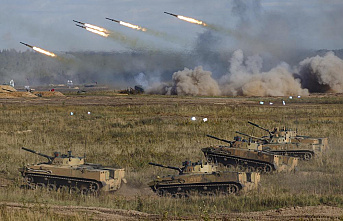Two words, "nuclear Energy" - then intervened.
As we head into Christmas week, atomic energy is a subject on which France, Germany and others differ widely. It has also become a major thorn in EU's side as the bloc of 27 nations decides whether to include nuke-generated energy among those economic activities that are eligible for sustainable investment.
Olaf Scholz, the German Chancellor, took office last week and Emmanuel Macron, the French President, agreed to most of Thursday's issues, including tensions between Ukraine and Russia and an immigrant dispute with Belarus.
The two leaders are still not able to agree on the sustainable investment rules. The summit was canceled by a rift over nuclear energy.
The debate over whether the EU should encourage nuclear power projects to make it more sustainable and energy-independent has rekindled after a dramatic rise in energy prices.
France, along with other EU countries that have nuclear power plants, has requested that nuclear power be included in the "taxonomy" by December 31st.
The group faced opposition initially from Germany and other members who wanted nuclear power to be ineligible in green financing. However, Scholz maintained a peacebuilding tone during the summit's last hours on Friday.
"We're talking about countries with differing business models. Scholz stated that it is important for each EU country to pursue its own strategy without Europe becoming divided. "We will all have to work together, despite any differences in priorities."
Germany's nuclear power plants will be shut down next year. France gets about 70% of its electricity through nuclear energy.
Macron last month announced that France would begin building its first nuclear reactors for decades. He revealed the plans and said that the new reactors would help France achieve energy independence and carbon neutrality by 2050.
Macron stated that it was not a Franco-German conversation during the press conference. There are many energy models across Europe. We want to agree on a taxonomy which allows us to continue our industrial policies and is consistent in decarbonizing our economy.
EU leaders met two years ago to agree that nuclear energy could be part the bloc's plan to make its economy carbon-neutral by 2050. The bloc's coal-reliant members were reassured by the decision to exclude the possibility of nuclear energy being used in their national energy mix. They are likely to be the ones most affected by the transition.
It remains controversial whether future nuclear power projects will be eligible for billions of euros under the European Green Deal, while also avoiding "greenwashing".
Many countries who want nuclear power to be exempt from green financing often point out the EU's guidance, which states that investments made by the pandemic recovery funds should not cause harm to the EU's environment goals.
Alexander De Croo, the Belgian Prime Minister, says that there is no agreement on how to eliminate nuclear power plants while still ensuring energy security for his citizens.
De Croo suggested that, in times of energy price crisis, both nuclear energy and natural gas might be temporarily eligible to receive funds.
De Croo stated that it is important to be able "to look sufficiently far ahead" and that technologies such as nuclear and gas could be useful technologies in medium-term to bridge the gap to fully sustainable energy.
Ursula von der Leyen, President of the European Commission, is now in charge. Her task is to present the list of activities that are eligible for green investment funds before the end, and decide whether natural gas and nuclear energy make it through.
Von der Leyen was pressured by environmental groups and Green European lawmakers not to include both.
Sven Giegold, a Green lawmaker at the European Parliament, stated that "Fossil Gas and Nuclear Power have no place within the EU Taxonomy" for Sustainable Activities.
Nuclear energy is a low-carbon alternative for fossil fuels. It was responsible for around 26% of electricity produced in the bloc in 2019. 13 EU countries have operational reactors.












